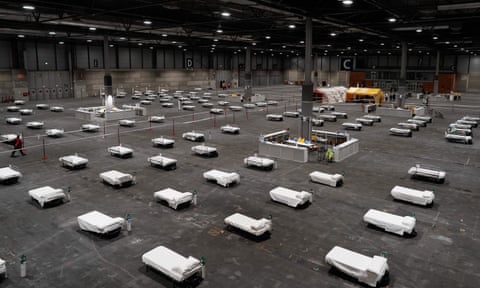On Saturday 7 March, 24 hours before hundreds of thousands of people rallied across Spain to mark International Women’s Day, and 9,000 faithful Vox supporters arrived in Madrid for a far-right jamboree, authorities in the northern region of La Rioja were taking some difficult decisions.
That weekend, not quite three weeks ago, Spain had confirmed just 430 coronavirus cases. After 60 of those were traced to a funeral in the neighbouring Basque country, La Rioja’s regional government ordered the quarantining of entire blocks of a neighbourhood in the small town of Haro.
Eighteen days later, Spain has confirmed 47,610 cases, and, with a death toll of 3,434, has logged more fatalities than China.
Health workers, who account for about 14% of the country’s coronavirus victims, are complaining about a lack of basic protective equipment; a Madrid ice rink has been converted into a makeshift morgue; and the capital’s flagship conference centre has gone from hosting the Cop25 climate conference to sheltering the sick as it is repurposed into an enormous field hospital.
For some of those 18 days, life continued as normal - tables and chairs began to recolonise pavements outside bars and cafes, and parks began to fill with picnickers as winter faded away.
Even as parts of Haro were being quarantined that Saturday afternoon, Fernando Simón, the head of Spain’s centre for health emergencies, said people had to make up their own minds about the risk from coronavirus if they joined the International Women’s day parades. “If my son asks me whether he can go, I’d tell him to do what he wants,” he told a press conference.

And so the marches went ahead, as did Vox’s huge meeting in Madrid and countless sporting fixtures. Three Spanish cabinet ministers – all of whom marched that Sunday – have contracted the virus, as has Begoña Gómez, wife of the Spanish prime minister. Vox’s leader and its secretary general also tested positive.
Worry hit Madrid on 11 March when, with 1,646 cases confirmed, regional government ordered all nurseries, schools and universities to close, as well as galleries, including the world-famous Prado.
Similar measures soon followed elsewhere and, on the evening of 12 March, the Catalan government ordered about 70,000 people in four municipalities in the Barcelona region to remain in their homes for two weeks after a steep increase in cases in the area.
As pressure on the government of the prime minister, Pedro Sánchez, mounted, toilet paper was frantically stockpiled, larders and freezers were filled, and the streets of central Madrid emptied. Then, a week after the Haro lockdown, the inevitable finally happened: Sánchez ordered an initial two-week lockdown.
For many in Spain, both living and dead, the national lockdown came too late. This week, which is becoming grimmer by the day, began with the defence minister revealing that soldiers drafted in to help tackle the outbreak by disinfecting residential homes had found a number of elderly people abandoned and dead in their beds.
In a country that takes justified pride in its family bonds, its conviviality and its national health service, these are bleak and sobering days.
But if, between the long hours of home-schooling, the phoning of friends, the bingeing on box sets and the fixating on recipes, people are wondering what exactly has happened and why, Spain’s doctors are not among them.
The pandemic did not drop out of a clear blue sky, they say – look at China, at South Korea and, far closer to home, at Italy. Then look back at Spain and remember that it is a country still suffering the effects of the 2008 economic crash and its attendant cuts.
Each night at 8pm, people gather on their patios and balconies to acknowledge the efforts of the country’s health workers. For a couple of minutes, while the applause bounces around each barrio, the fear is forgotten, elbowed out by gratitude and solidarity.
But when the ritual thanks are no longer needed, the clamour for answers will be just as loud and insistent.
